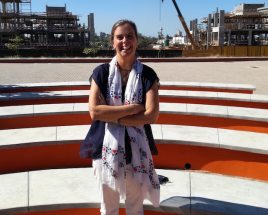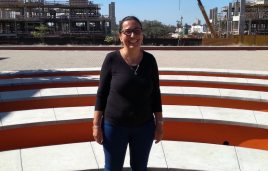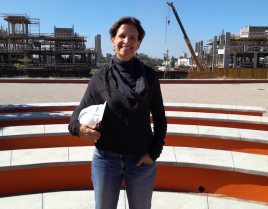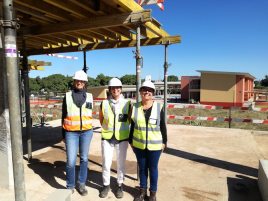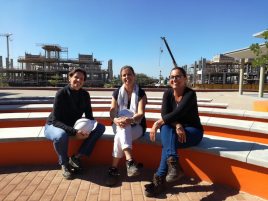Women in construction leadership at Aga Khan Academy Maputo
The third Academy to be built in the network, the Aga Khan Academy Maputo in Mozambique sits on a 22.5-hectare site in Matola, about 20 minutes west of Maputo's city centre. The Academy’s campus is currently being purpose built to provide a high quality education to talented students of all backgrounds, with construction on the site taking a phased approach to meet the needs of students as the school grows.
When fully complete, the Academy will offer schooling for students aged 3 to 18 years. The Academy first opened in August 2013 for students in kindergarten to grade 3. At that time, the students were housed on the Nursery School campus, which was built during the first phase of construction. The second phase was completed recently with the opening of the Junior School campus in January 2018. The Junior School includes 12 additional classrooms, a library, outdoor play and sports areas, as well as office and reception spaces.
There is still much more in store for the Academy. Plans are currently underway to add a Senior School campus, multiple student residences, a water pump station, additional sports facilities, multipurpose spaces and office space. Construction has already begun on some of the residential buildings and the water pump station.
When considering the personnel involved in the Academy’s construction, it is easy to assume that the leadership positions are taken up mostly by men, because these fields are often male-dominated. However, it is interesting to note that on this project, women are in leadership roles that are key to the project's success.
The women behind the construction
One of the women in a senior role in the construction project is Laura Ivens Brandão, Senior Project Manager and Client Representative at the Aga Khan Academy Maputo. She talks about the background to the project, saying, "A reputable team of international and local architects and engineers have designed the Academy to be in line with AKDN's [Aga Khan Development Network] pursuit of excellence in both the physical facilities as well as the quality of education intended to be imparted at the finished facility."
Regarding the construction process, she notes, "The phasing of construction takes precisely into account the needs of the school. All the milestones were coordinated with the needs of the curriculum of the school." For example, this includes timing for construction of the science building and sports facilities to ensure that as students progress through their International Baccalaureate programme at the school, they have access to the facilities needed for the curriculum. Student residences are also being built, in time to allow students from other parts of Mozambique, Africa and internationally to attend the Academy at the Senior School level.
Laura, who is a civil engineer by trade, joined the Academy in July 2017 but began her involvement with the project in 2012 as the general manager of the project management company for the first phase of construction. In her current role, she ensures that the Academy's interests are protected at all times. She oversees the project management operations and project teams, mentoring and guiding them as necessary, and ensuring that they deliver within the budget, time and quality specified. She also manages all external relationships with other AKDN agencies, project management firms, government departments, and statutory and utility authorities.
Helena Cardoso is a project manager with Royal HaskoningDHV (RHDHV), an international engineering and project management consultancy that is providing project management services for the construction. She has worked on the Academy project since November 2017 and is one of 16 representatives from RHDHV, two of whom are women. As a project manager, she is involved in the procurement of contractors and suppliers and in the supervision of construction works, including technical quality, planning and financial control.
"It is a very large school project. The quality standards are high. The buildings are simple; however, there are a lot of contracts to manage and [we need] to ensure timely outputs," says Helena.
Maria Menezes Sacadura Botte is the owner and managing partner of MM Arquitectos, the Mozambique-based architectural firm working on the project since November 2014. She founded the company almost four years ago, and while it is a small company of ten people, it employs another six women, and five out of its seven architects are female. As an architect, Maria is the lead project manager and designer from MM on this project and is involved in the architectural design of the Academy in partnership with Nuno Leónidas Arquitectos Associados Lda. (NLA), a firm based in Portugal. "From the initial phases of concept design and schematic design, the work was divided but always done in very close contact so as to have a seamless architectural solution and language,” she explains. “All decisions and solutions go through both teams, but MM is more involved in the day-to-day construction because we are located in Maputo and close to the site," says Maria.
"The design of the Academy in Maputo was a compilation of several considerations: the very specific program of the Aga Khan Academies, the limitation in sophisticated solutions and materials, and the hot and humid environment." She notes the following design elements as an example of how the latter has been addressed: "The use of earthy colours, large shaded areas and natural ventilation." To overcome local limitations, they "looked closely at building solutions and materials used in Mozambique, analysed those that were successful through time, and tried to implement them in the design." However, she says that the end user was their main inspiration. "A school of a high standard, with a feeling of belonging to the landscape, with a scale and comfort allowing children to learn and thrive in a positive and happy environment was our goal."
Laura, Helena and Maria all collaborate closely as part of their respective roles in the project to address issues and questions, solve problems that arise, adapt aspects that need to be changed and learn for future phases of the construction. While the project is challenging due to difficulty in procuring materials and finding the skilled labour needed to ensure a high standard of quality and detail, Maria says, "I believe that this project is of good quality and there is a solid and dynamic team that will bring it to completion regardless of the challenges faced."
A top quality school
"With the delivery of the second phase of construction, it was very gratifying to witness the joy of the students and all the school staff," says Laura. "They are amazed at the level of facilities that are being provided." Laura has three daughters studying in Mozambique at two different schools, both of which are good schools. Yet she has "no doubt that the Aga Khan Academy will be the best school in the country." Maria seconds this sentiment by saying that "the students are extremely happy, and I believe so are the teachers. I have been living in Mozambique for a long time and have children of my own, and I can safely say that the Aga Khan Academy is the school with the highest quality infrastructures in the area and the country."
For Maria, this project is more than just another on her list of accomplishments. "It is a project that I can be additionally proud of because of its impact on society. Offering children the chance to have a superior education, regardless of their background and financial situation, is to be praised."
Laura is equally fascinated by the goals of the project and also feels honoured to be a contributing member. She says, "The mission is to educate and develop students to become highly qualified and socially responsible professionals and leaders, which Mozambique needs to support its economic development. It is to provide deserving children, whatever their social conditions, with the highest standard of primary and secondary education, which focuses on leadership, ethics, pluralism, and community service. It is to enhance the quality of public education in Mozambique through the training of teachers, school leaders, and ministry professionals, via the Professional Development Centre and outreach programmes."
Women in leadership in construction
When asked about their thoughts on women in leadership in the construction industry, all three women express similar sentiments. Helena says, "I really do not think about this issue. If we have capability, the fact that we are women in a world of men does not make us feel diminished. People respect others for their competences and attitudes and not for the race or the sex."
Laura concurs: "It is not very common to have a team where women are in key management roles. Personally, I am neither against nor for this because my professional career is not centred around gender being important, but on the professionalism of each individual." She shares that from the moment she decided to study civil engineering, the question of women in the field would sometimes come up, but it never deterred her. "It is funny to have to show to some…that women can manage and have leadership positions."
"I think that we make a great team," says Maria. "I am sure it is not because we are all women but because we are all qualified, driven and ethical professionals that have a common goal and that is to make the best Academy possible in Mozambique within the timeframe and budget." She admits there aren't many women in the construction industry in Mozambique in managerial roles, but she thinks there should be. "As long as the person is qualified and driven, gender does not make a difference."
By Ceisin Popat
publications


